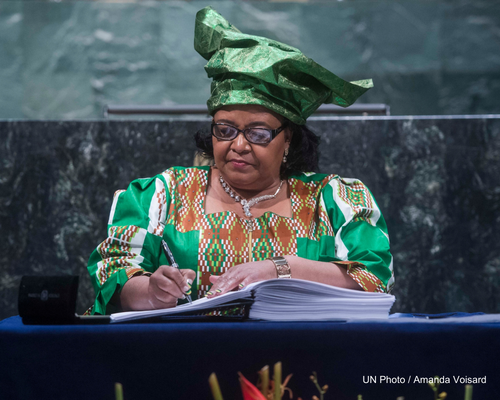
Law of Treaties - Self-paced track - 2025 - Q1
The overall goal of this self-paced course is to provide participants with the fundamental theoretical and practical knowledge of the key issues surrounding the International Law of Treaties. You will gain a comprehensive understanding of the provisions of the universal conventions as the sources of the International Law of Treaties and developed critical skills of analysis and interpretation of cases regarding contemporary practice.
The International Law of Treaties is a set of international principles and rules regulating the conclusion procedure of treaties, as well as the issues of operation, amendments and modifications, termination, suspension and invalidity of treaties. For those involved in the drafting, negotiation and conclusion of international treaties, a sound knowledge of the Law of Treaties is indispensable. Efficient implementation and application of international legal norms is impossible without knowing the essentials of the International Law of Treaties. UNITAR’s course on the Law of Treaties is designed to cover both the theoretical and the practical aspects of this subject, starting with the basic notions, sources, subjects, principles, and scope of application of conventions forming the base of the Law of Treaties.
At the end of the course, you will be able to:
- Demonstrate profound understanding of the key issues of the International Law of Treaties, including knowledge of the important provisions of the universal conventions that form the base of the International Law of Treaties;
- Identify and apply the rules and procedures of the International Law of Treaties to practical cases, find the relevant sources of law and build legal arguments;
- Analyze and interpret international judicial decisions and opinions concerning the International Law of Treaties;
- Apply theoretical knowledge and practical skills to their professional activities in fields related to the Law of treaties. For example, preparing a draft of a treaty, or participating in the negotiations and international conferences on the elaboration and adoption of an international treaty.
The course requires about 30 hours to complete. If you do it directly, with leave from work, it could take you about 1.5 week. If you do not have leave from work, it could take you about 3 weeks back to back. But, since the course is self-paced, you can divide the work within the 3 month period.
The course consists of the following modules:
Module 1 "The Basic Notions, Sources, and Principles of the Law of Treaties":
- The Basic Notions of the Law of Treaties
- Who Can Conclude International Treaties?
- Parties to a Treaty and Third States
- The Language, Structure and Title of International Treaties
Module 2 "Preparation of Treaty Text, Reservations, and Depositaries":
- Negotiation and Preparation of the Treaty Text
- Phases of the Conclusion of Treaties
- Reservations to Treaties
- Depositaries of Treaties
Module 3 "The Operation, Termination, Suspension of Treaties and Consequences":
- Entry into force and application of treaties
- Amendment, revision and modification of treaties
- General rules on validity, continuance in force and termination of treaties
- Termination and suspension of operation of treaties
- Invalidity of treaties
- Consequences of the invalidity, termination or suspension of the operation of a treaty
- The procedure to be followed with respect to invalidity, termination, withdrawal from or suspension of the operation of a treaty
- Interpretation of Treaties
This self-paced course promotes an interactive approach through lessons and multimedia material, stimulating critical thinking. It provides a lot of flexibility, since you will be able to complete the course at your own pace and timeframe. Contents and activities are practice-oriented and under a self-assessment approach, so participants will learn through practical examples and assignments associated with research and case scenarios. This experience will be supported by the UNITAR team, additional resources and material, and visuals such as infographics and videos.
Government officials, international civil servants, lawyers, judges, NGO representatives, academics and private sector professionals in the field of international law and international organizations.
Certificates: Participants who successfully meet the minimum passing requirements at the end of the course will receive a UNITAR Certificate of Completion.
Technical Requirements: The course is delivered through UNITAR’s Virtual Learning Environment and participants will require a reliable internet connection throughout its duration.

